Originally posted by Risto the Great
View Post
Philiki Eteria founders most likely Vlachs & Slav
Collapse
X
-
I thought the Modern Greek language was completely unintelligible with the Ancient Koine tongue? It certainly appears that way when I look at the two side-by-side anyway.
-
-
Of course, now they all speak perfect ancient Greek. The best experiment ever.
Leave a comment:
-
-
Quote: "First of all, lets’ take Tsakalov, the less famous of them. I couldn’t find any indication that he was Vlach. He was born in Ioannina (where his mother comes from). His father indeed comes from Tyrnavos where Vlachs (specifically the so-called Arvanito-Vlachs) DO exist, but I couldn’t find anything specific."
1) Arthur Evans (in an open letter to The Times on October 1st, 1903.):
The truth is that a large number of those described as Greeks are really Roumans. Till within recent years Hellenism found a fertile field for propaganda among the representatives of the gifted Romance speaking race of the Pindus region. Today Janina has quite forgotten its Rouman origin, and has become a center of Hellenism.
2) http://www.farsarotul.org/nl11_1.htm
Tyrnavos, a town to the north, is perhaps 60 percent Vlach, mainly those from Avdhella and Samarina. [--> 60 percent Vlach-speaking?? And this was towards the end of the 20th century.]
Leave a comment:
-
-
As far as I see, none of these five was Vlach.Originally posted by Carlin View Post
First of all, lets’ take Tsakalov, the less famous of them. I couldn’t find any indication that he was Vlach. He was born in Ioannina (where his mother comes from). His father indeed comes from Tyrnavos where Vlachs (specifically the so-called Arvanito-Vlachs) DO exist, but I couldn’t find anything specific. His father's name was Tekelis or Tsakalos and he made his name Russian (Tsakalov) when he moved to Russia.
Regarding the second paragraph neither Kolokotronis (Peloponnesian), Karaiskakis (Saracatsanos, a Greek nomadic tribe), Botsaris (Souliote, a separate more Hellenised Arvanite clan) or Androutsos (Arvanite father, mother from Preveza) are Vlachs. Actually, you can find more detailed discussions for each one of them in the forum, using the forum search engine.
So, are we sure this is not from the book… “We are all Vlachs”? Is this a new fashion that any ass suddenly calls everybody a Vlach and then another ass calls everybody an Arvanite? Any source or justification would be appreciated (I mean by these authors, not you). Maybe I’m missing something.
A few posts ago, an author mentioned a local legend from a Vlach village that Kolokotronis family (remotely?) comes from it. Well, that is a legend. It doesn’t seem to have any value. At least, Kolokotronis didn’t have any knowledge of such ancestry; and still that wouldn’t make him a Vlach.
====Last edited by Amphipolis; 05-19-2016, 02:10 PM.
Leave a comment:
-
-
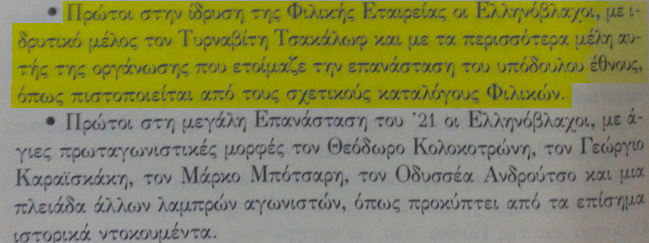
HellenoVlachs first in the foundation of the Friendly Society, a founding member of Tirnavos Tsakalof with most members of this organization was preparing the revolution of enslaved nation..
Source: Γιωργης Εξαρχος - ''Οι Ελληνοβλαχοι Αρμανοι'' ("The Hellenovlahoi Armanoi")
For fair use.Last edited by Carlin; 05-19-2016, 03:28 PM.
Leave a comment:
-
-
I'm afraid the answer is yes.Originally posted by Amphipolis View PostCough... Cough...
That is easier to check, since the founders of the "Friends' Company" were... only three (3) and then a fourth was added. Xanthos, Skoufas, Tsakalov and Anagnostopoulos. Was ANY of them Vlach?
Leave a comment:
-
-
Cough... Cough...Originally posted by Carlin View PostIt was among the Vlah merchants of Odessa that the Philike Hetairea was founded, and revolutionary literature was produced on the Vlah printing presses of the Pului brothers in Vienna.
Link:
http://www.academia.edu/302560/_The_..._the_Evidence_
That is easier to check, since the founders of the "Friends' Company" were... only three (3) and then a fourth was added. Xanthos, Skoufas, Tsakalov and Anagnostopoulos. Was ANY of them Vlach?
Leave a comment:
-
-
Interesting. Could it be because Vlachs have almost no traditions of their own that they were so motivated in adopting or creating the modern greek one whereas other peoples still preferred to cling to their own traditions and resisted assimilation.Originally posted by Carlin View PostThere is plenty of evidence that Tsakalof was of Vlach (Rouman) extraction, considering that he was born in Janina (Ioannina).
Modern Greeks and modern Bulgarians like to quote Arthur Evans, but he was also of the opinion that the Bulgars, to some degree, represent a Slavonized Rouman population. On the other hand, he stated openly that the 'Greeks' of Macedonia and Janina regions were really Roumans in disguise.
Arthur Evans (in an open letter to The Times on October 1st, 1903.):
The truth is that a large number of those described as Greeks are really Roumans. Till within recent years Hellenism found a fertile field for propaganda among the representatives of the gifted Romance speaking race of the Pindus region. Today Janina has quite forgotten its Rouman origin, and has become a center of Hellenism. Athens, the nearest civilized centre, offered natural attraction to the quick-witted mercantile element in the towns. But, for good or evil, the tide has turned. A counter-propaganda, of which Bukarest is the center, has made itself felt, and the Rouman civic element east of Pindus is probably lost to Hellenism, notwithstanding the fact that much money is expended by Greek committees in the endeavor to gain recruits for Greek nationality. Parents are actually paid to send their children to Greek schools.
Let's throw this in as well.
The Orthodox Eastern Church, Adrian Fortescue [Catholic Truth Society, 1908 - 451 pages]:
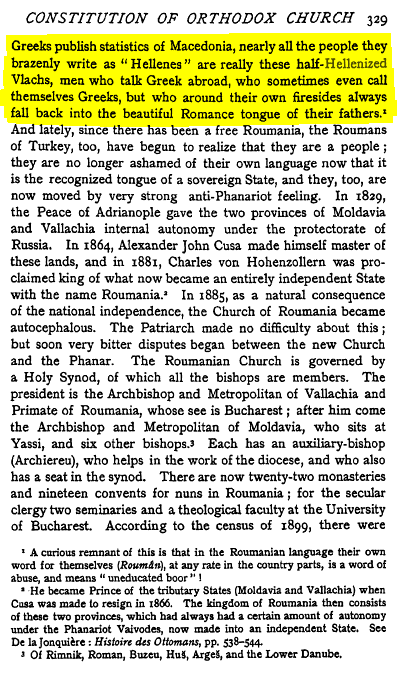
I also like this one quote, although it is unrelated to this thread.
Robert Liddell - "The Morea" - Johnatan Cape, London, 1958, referred to by VB, p. 6.:
The first prime-minister of Greece, Ioannis Colletis was a "Vlach of Sirakou", who on meeting the Romanian Foreign Secretary in Paris admitted that his parents back in Sirakou "speak at home only Vlach".
All in all, I do not want to take away anything from the fact that it was mostly Vlachs that created the modern Greek literacy and identity.
Leave a comment:
-
-
There is plenty of evidence that Tsakalof was of Vlach (Rouman) extraction, considering that he was born in Janina (Ioannina).Originally posted by TerraNova View PostSo...no evidence about Tsakalov.
That's ok.

Modern Greeks and modern Bulgarians like to quote Arthur Evans, but he was also of the opinion that the Bulgars, to some degree, represent a Slavonized Rouman population. On the other hand, he stated openly that the 'Greeks' of Macedonia and Janina regions were really Roumans in disguise.
Arthur Evans (in an open letter to The Times on October 1st, 1903.):
The truth is that a large number of those described as Greeks are really Roumans. Till within recent years Hellenism found a fertile field for propaganda among the representatives of the gifted Romance speaking race of the Pindus region. Today Janina has quite forgotten its Rouman origin, and has become a center of Hellenism. Athens, the nearest civilized centre, offered natural attraction to the quick-witted mercantile element in the towns. But, for good or evil, the tide has turned. A counter-propaganda, of which Bukarest is the center, has made itself felt, and the Rouman civic element east of Pindus is probably lost to Hellenism, notwithstanding the fact that much money is expended by Greek committees in the endeavor to gain recruits for Greek nationality. Parents are actually paid to send their children to Greek schools.
Let's throw this in as well.
The Orthodox Eastern Church, Adrian Fortescue [Catholic Truth Society, 1908 - 451 pages]:

I also like this one quote, although it is unrelated to this thread.
Robert Liddell - "The Morea" - Johnatan Cape, London, 1958, referred to by VB, p. 6.:
The first prime-minister of Greece, Ioannis Colletis was a "Vlach of Sirakou", who on meeting the Romanian Foreign Secretary in Paris admitted that his parents back in Sirakou "speak at home only Vlach".
All in all, I do not want to take away anything from the fact that it was mostly Vlachs that created the modern Greek literacy and identity.
Leave a comment:
-
-
These greekoids are sad. The greekoids had settlements in Macedonia. They werent Macedonians.
Leave a comment:
-
-
T.M, Daskalot,
I have some more information on the secret Albanian and Turkish words used by the Hetairetai.
I'll post some more shortly, and provide more detailed references.
Leave a comment:
-
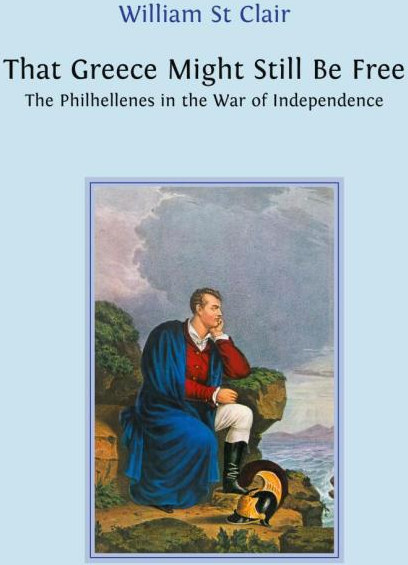

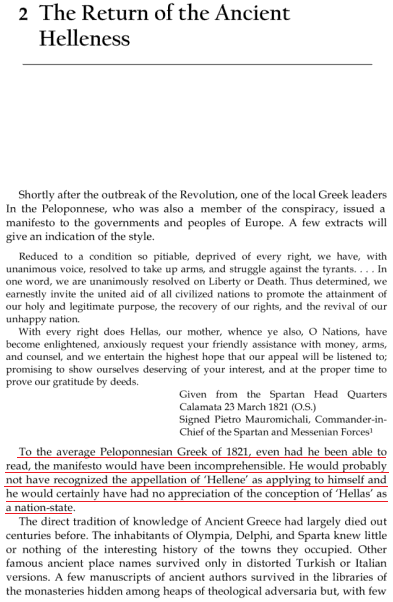
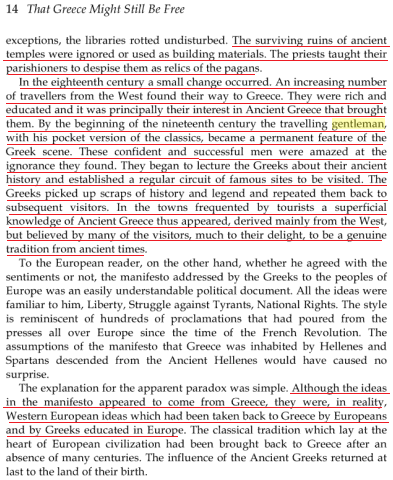

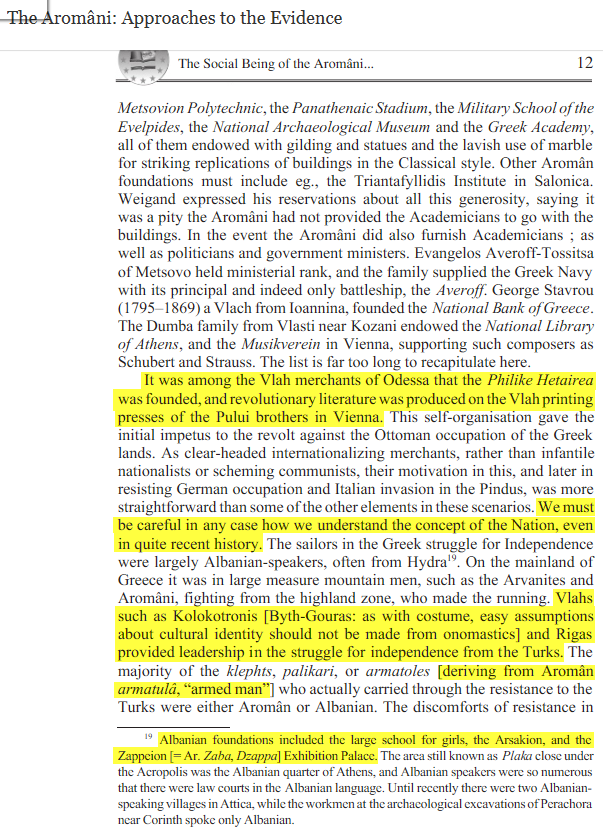

Leave a comment: